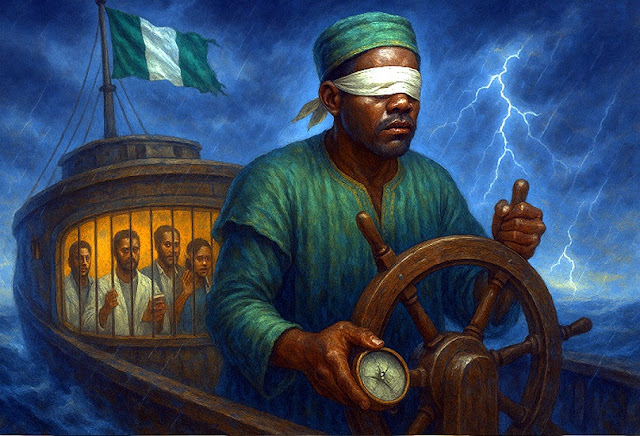A country’s true tragedy is not always declared by famine or war—it often begins silently, when the most incapable steer the fate of the most capable. Nigeria, Africa’s most populous nation, stands today as a glaring case study of this dangerous reversal.
Once celebrated for its brilliant minds, rich natural resources, and indomitable spirit, the country now wrestles with a contradiction: how did a land so full of promise become so chronically mismanaged? Many point to a painful irony—those most unfit to lead now sit at the helm, while those most qualified to rebuild remain sidelined, silenced, or exiled by circumstance.
This phenomenon isn't merely political; it is psychological, cultural, and systemic. It’s the school dropout dictating education policy, the looter championing anti-corruption, the ethically bankrupt preaching reform. The weight of incompetence hangs heavy, felt in crumbling infrastructure, epileptic power supply, insecurity, and an exodus of talent. At the root of this crisis lies one haunting truth: the worst are leading the best.
Talented professionals—doctors, engineers, writers, entrepreneurs—are leaving the country in droves. Not because they do not love their homeland, but because their skills are either underappreciated or undermined by a system that thrives on mediocrity. Meritocracy is muted. Connections and loyalty to political godfathers trump expertise and innovation. Nigeria’s best minds, capable of reshaping the nation's story, are left navigating foreign lands, while the corridors of power at home are clogged with opportunists.
This upside-down leadership structure creates a dangerous cycle. The brilliant avoid politics, deeming it toxic. The competent retreat to private spheres. The bold are tamed or bought off. What remains is a vacuum, filled quickly by the loudest, not the wisest; the richest, not the most principled.
Across the nation, the signs are unmistakable. Universities underfunded. Hospitals understaffed. Roads barely passable. Elections marred by violence and manipulation. And yet, each election season, familiar names return like a bad rhythm—a reminder that the system is designed not to evolve, but to recycle failure.
The cost is more than economic—it is spiritual. A generation grows up believing that corruption is normal, that success without effort is acceptable, and that leadership is a reward for loyalty rather than competence. The collective psyche is bruised, and with each failed promise, hope becomes a scarce resource.
But the story need not end this way. The awakening must begin where it hurts the most—with the realization that Nigeria cannot rise when its best are buried under the weight of its worst. There is a call, loud and clear, not just for change, but for inversion—where the brightest once again lead, where merit reclaims the microphone, and where leadership becomes a responsibility, not a reward.
Until then, the nation drifts—a ship captained by the untrained, sailing past its own potential, while the world watches, shaking its head.
*written by DGT!













![Content Creator Angelica Kelechi Speaks Out on Alleged Sexual Assault at Khloe Abiri’s Spa [VIDEO]](https://blogger.googleusercontent.com/img/b/R29vZ2xl/AVvXsEgQStip4cn2DAOvQ2hNFU30OAFWoxfQIDOnStd0uVgwwxKrFAQYYvtFni6QV04OGP8dyKk5TCAhXM5es9linl1ClhjPzaazz2tTt0LmJ5lFVe5202o2McF9QROT1v2hEyNTdY-M1KRuLTY6OqqysKNfcsY5bCtwCIP8wEQ4AXcfQfTaXWWZiixqf82NDH5a/w72-h72-p-k-no-nu/abiri-khloe123.jpg)






0 Comments
Hey there! We love hearing from you. Feel free to share your thoughts, ask questions, or add to the conversation. Just keep it respectful, relevant, and free from spam. Let’s keep this space welcoming for everyone. Thanks for being part of the discussion! 😊